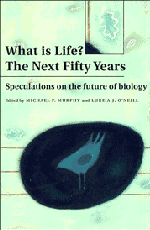Book contents
- Frontmatter
- Contents
- List of contributors
- Preface
- 1 What is Life? The next fifty years. An introduction
- 2 What will endure of 20th century biology?
- 3 ‘What is life?’ as a problem in history
- 4 The evolution of human inventiveness
- 5 Development: is the egg computable or could we generate an angel or a dinosaur?
- 6 Language and life
- 7 RNA without protein or protein without RNA?
- 8 ‘What is life?’: was Schrödinger right?
- 9 Why new physics is needed to understand the mind
- 10 Do the laws of Nature evolve?
- 11 New laws to be expected in the organism: synergetics of brain and behaviour
- 12 Order from disorder: the thermodynamics of complexity in biology
- 13 Reminiscences
- Index
2 - What will endure of 20th century biology?
Published online by Cambridge University Press: 03 February 2010
- Frontmatter
- Contents
- List of contributors
- Preface
- 1 What is Life? The next fifty years. An introduction
- 2 What will endure of 20th century biology?
- 3 ‘What is life?’ as a problem in history
- 4 The evolution of human inventiveness
- 5 Development: is the egg computable or could we generate an angel or a dinosaur?
- 6 Language and life
- 7 RNA without protein or protein without RNA?
- 8 ‘What is life?’: was Schrödinger right?
- 9 Why new physics is needed to understand the mind
- 10 Do the laws of Nature evolve?
- 11 New laws to be expected in the organism: synergetics of brain and behaviour
- 12 Order from disorder: the thermodynamics of complexity in biology
- 13 Reminiscences
- Index
Summary
Acknowledgements
The original version of this lecture was published in 1993 in the book Man and Technology in the Future, a summary of an international seminar arranged by the Royal Swedish Academy of Engineering Sciences, Stockholm, Sweden.
‘QUO VADIS HUMANITAS?’
We find ourselves in the last decade of this century; no previous century has had such a profound effect on human life. Perhaps no century has produced such a level of apprehension and fear, anchoring them in the consciousness of man. One has become mistrustful. When a discovery becomes known nowadays, the first question is not, ‘Of what use will it be to mankind?’ (as in earlier times) but, ‘What damage will it cause, and how will it diminish our well-being and health?’ Our present state of well-being is bestowed upon us mainly owing to scientific knowledge; this has brought life expectancy up to 75 years, approaching the biologically natural age limit. At the beginning of this century, life expectancy was a mere 50 years and at the beginning of the previous century it was only about 40 years. In developing countries, the curve of life expectancy is also rising, although it lags about 50 years behind ours; meanwhile, our life expectancy is approaching an upper limit. Yet, as never before, we peer apprehensively into the future. This is despite the fact that in the political sector, some of the gravest and most grotesque developments instigated by humanity in this century appear to be in the process of rectification. It is unlikely to be decided in this last decade whether these changes are really for the better.
- Type
- Chapter
- Information
- What is Life? The Next Fifty YearsSpeculations on the Future of Biology, pp. 5 - 24Publisher: Cambridge University PressPrint publication year: 1995
- 5
- Cited by



